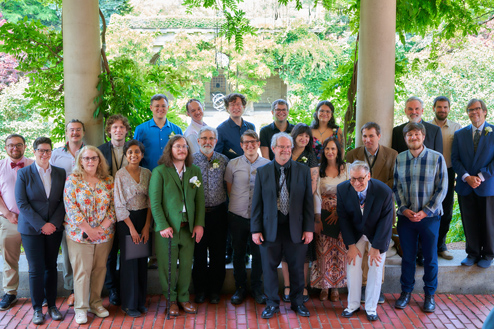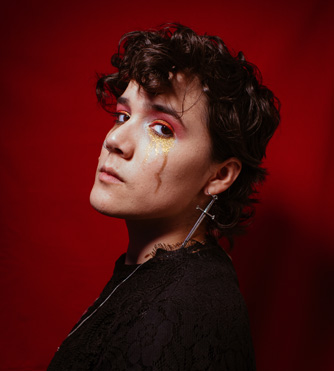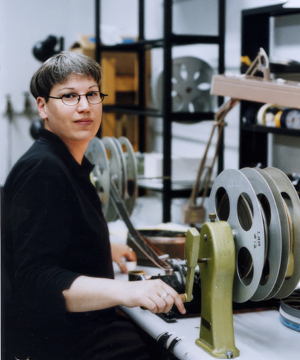
Between 2016-2024, a $5,000 grant was awarded annually by the FNF through the Nancy Mysel Legacy Fund to a deserving undergraduate or graduate student in film restoration/preservation or moving image archive studies.
2024 GRANT RECIPIENT lucas cullen's YEAR IN REVIEW

LUCAS CULLEN, IN GREEN SUIT, WITH CLASSMATES AND THE MOVING IMAGE DEPARTMENT STAFF AFTER 2024 GRADUATION CEREMONY AT L. JEFFREY SELZNICK SCHOOL OF FILM PRESERVATION [PHOTO BY ELIZABETH CHIANG]
Lucas Cullen is an archivist, artist, film programmer, and writer who grew up living next to a limestone quarry in the Welsh Mountains of Pennsylvania with his twin brother, Derrick. He received a B.S. in Film, Video, & Theatre and a minor in English Language & Literature from Stevenson University, and recently graduated from the Certificate Program at The L. Jeffrey Selznick School of Film Preservation in Rochester, New York.
I had an incredible time at the L. Jeffrey Selznick School of Film Preservation this year. I’ve developed a plethora of skills, and I was able to put said skills to the test during the last four months of the program, when I worked on a personal project that involved inspecting, repairing, viewing, and cataloging 16mm prints from a filmmaker’s personal collection that was donated to the George Eastman Museum—using Kevin Rockett’s The Irish Filmography (1996) to inform my title selection. I also developed strong connections with my fellow classmates, who came to Rochester from all over the world and were invaluable sources of friendship, knowledge, and support—and excellent teachers in their own right—during an intense year. After graduation, I was given the opportunity to stay on as an intern for the Moving Image Department, and I spent the summer cataloging oversized portraits and processing 35mm trailers and recently acquired 35mm cartoons. I was grateful for that additional time with the MID staff who’ve had such a profound impact on me; I miss them more and more every day.
What was already easily the best year of my life became that much more enjoyable when the financial burden of tuition was alleviated by the FNF-Nancy Mysel Legacy Grant, and I want to thank the committee again for their generosity and support. Since being notified that I was this year’s recipient, my goal has been to honor Nancy’s memory to the best of my ability; I hope that I’ve done so thus far, and I give my word that I’ll continue to do so as I move forward in my career.
If you’re in the Philadelphia area, make sure to come see some movies with me at Phoenixville’s Colonial Theatre for NOIR CITY: Philadelphia, which runs November 15 - 17!
—Lucas Cullen
2023 GRANT RECIPIENT GABRIELLE NORTE'S year in review
 What a year it has been. 2023 was a year of immense learning and growth, supported by passionate people, including those at the Film Noir Foundation. I celebrated my first year at UCLA and as an AV Preservation Assistant with UCLA Library, where I continued to work on vast collections of audiovisual material, including an ongoing extensive inspection and rehousal project of the Synanon film collection. My job has been a huge asset in my education and has given me the space to learn the process of working with all kinds of media formats.
What a year it has been. 2023 was a year of immense learning and growth, supported by passionate people, including those at the Film Noir Foundation. I celebrated my first year at UCLA and as an AV Preservation Assistant with UCLA Library, where I continued to work on vast collections of audiovisual material, including an ongoing extensive inspection and rehousal project of the Synanon film collection. My job has been a huge asset in my education and has given me the space to learn the process of working with all kinds of media formats.
This summer, I was able to fulfill a dream of mine by interning with UCLA Film & Television Archive. My entry into the film preservation field was greatly influenced by the amazing work the Archive had done on so many films I had seen, and to wake up nearly every day to spend time within the grand space with the people behind the work I had come to be enthralled by, was a monumental experience for me. It was especially potent for me knowing Nancy’s legacy as a film preservationist at the Archive, and felt like the best possible way to honor her legacy. Along with two other fellow UCLA MLIS students, I was a part of the inaugural cohort of Present Preserving the Past interns, an initiative funded by the Myra Reinhard Foundation to preserve and restore UCLA student films from the 1960s through the 1980s. Over the course of ten weeks, I inspected and prepped several short films, but selected Rich (1983)–a film by LA Rebellion filmmaker, S. Torriano Berry–to be my project focus. Working with the best elements, I scanned the A/B roll negatives using the Lasergraphics ScanStation, completed several weeks of digital restoration with DRS Nova by MTI Film, and compiled and graded the final film in Adobe Premiere Pro. During the course of the internship, Archive staff invited us to sit in on several QC sessions for their current projects, which was an enlightening experience to hear seasoned professionals discuss timing, intertitle recreation, and sound levels. On December 1st, at the Billy Wilder Theater in Westwood, the three UCLA student films restored were screened, and I moderated the Q&A with the filmmakers afterwards. Getting to do this work was the most rewarding time of my year and something I will cherish for a long time.
In Fall 2023, I began my second year and took on the position as Co-Chair of the UCLA student chapter of the Association of Moving Image Archivists (AMIA), where I helped facilitate several audio and film workshops, teaching hands-on about inspection, preparation, and digitization. Also, as Co-Chair of UCLA AMIA, I participated in my first Home Movie Day, which was held this year at the Academy Museum. Our chapter helped plan and volunteer before and during the event, and I had the chance to do film inspection during the day. We also received dozens of submissions of home movies that the chapter will be digitizing for free in our Media Lab in the new year.
As a personal project, I inspected, cleaned, and digitized twenty-four Super 8 home movies of my father growing up in the 1970s on the Pala Indian Reservation and the process inspired me to use the films to develop a larger film project called The Things We Didn’t Know We Forgot, which will combine these films with footage I am also shooting on Super 8 to create a conversation with and about the past and the power of memory and legacy, especially as Indigenous people. As a filmmaker, this is a new direction for my work, one in which requires me to create in ways I never have before. I’m currently pursuing funding for this project, as it requires such, and hoping to develop the film further in 2024.
I cannot express my gratitude enough for the support of the Nancy Mysel Legacy Grant from the Film Noir Foundation and how receiving the grant started my year with inspiration and empowerment to pursue all these avenues. This year is one I will never forget and I couldn’t have done it without this support. Á•čama (Thank you)!
—Gabrielle Norte

Nancy Mysel
Legacy of a Cinema Savior
BY EDDIE MULLER
The fortunes of the Film Noir Foundation suffered a devastating setback in 2012. Nancy Mysel, film preservationist for UCLA Film & Television Archive, who supervised our restorations of The Prowler and Cry Danger, lost a long-running battle with cancer.
What makes this tragedy all the more intolerable is that Nancy, only 45, had just begun her cherished career as a cinema savior. In a few short years, she had made an astounding impact managing superb restorations of many films. In addition to rescuing more than a few films noir, Nancy resurrected a vital facet of film history with preservations of Dorothy Arzner's pre-Code films made at Paramount in the early 1930s.
A native of Paterson, New Jersey, Nancy began work as a preservationist at Boston University. She'd worked at UCLA Film & Television Archive since 1999, benefiting from the tutelage of legendary UCLA preservationist Robert Gitt. Together, they restored more than two-and-a-half hours of outtakes to create the documentary Charles Laughton Directs 'The Night of the Hunter,' included in the 2011 Criterion DVD of the 1955 feature.
I can't overstate how essential Nancy was to our success. Her commitment to the highest level of restoration set an immense standard, which she challenged everyone to meet—including us. Although personally shy and self-effacing, she was a passionate preservationist and an exacting taskmaster. The best way we can honor her legacy is by ensuring that everything we do in the future measures up to her incredible standard of excellence.
Before her death, Nancy sent me the following note: "There's no denying working with you on our beloved genre provided the greatest opportunities and enjoyment of my career. That you were so much fun to work with is only the icing on the cake. The screening of Cry Danger at the Castro was a special highlight I was able to share with my family. Thank you again, and keep fighting the good fight!"